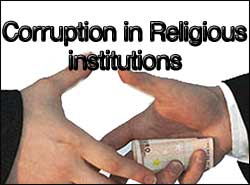A Times of India study estimates that monetary value of petty corruption in upto 11 basic services provided by the government, like education, healthcare, judiciary, police, etc which is to be around Rs.21,068 crores. India today still ranks in the bottom quartile of developing nations in terms of the ease of doing business, and compared to China and other lower developed Asian nations, the average time taken to secure the clearances for a startup or to summon bankruptcy is very much greater. According to Transparency International, it is has been anaylsed that in India Bihar is the most corrupt state. The Economist magazine stated recently that "Bihar become a byword for the worst of India, of widespread and inescapable poverty, and also of corrupt politicians indistinguishable from mafia-dons they patronise, caste-ridden social order that has retained the worst feudal cruelties".

Spiritual transformation is the key for creating a non-corrupt secular society. Laws such as Lok Pal Bill would only act as band aids as said by Mr. Anna Hazare. The religious heads and State should concentrate on reforming the religious institutions first because corruption is eating into �our spiritual wealth'. If Lok Pal was meant for preventing corruption in public life, Dharmika Parishad was to address the problem of corruption, commercialisation and politicisation of temples. The State government and The Goverment of Karnataka had already amended the Endowments Act and a Dharmika Parishad had been constituted in the State. Well-wishers have pointed out that the country needs a Central Endowments Act to make it mandatory for all States to have a Dharmika Parishad. An action plan in this regard was given to Sri Sri Ravishankar of Art of Living, who has sought the cooperation of Mr. Anna Hazare and Baba Ramdev to eradicate corruption in temples.
|
Disclaimer:
This web page explains the corruptions that occured in India. The information are collected from the media reports. www.indianmirror.com or it owners do not take any responsibility for the authenticity of the contents. Since some cases are in the court of law, we do not endorse any cases or do not conclude on the same. If you need any changes to be done on the above information, kindly contact us with valid proof. However sincere attempt is being made to create awareness in the society against this evil and to prepare the younger generation for a corruption free India. |


